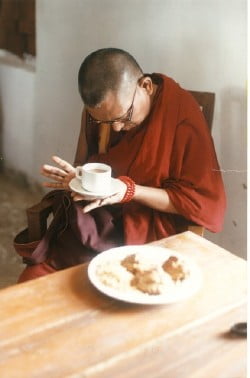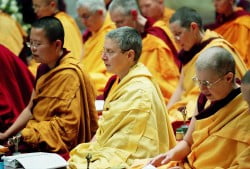Essential Things to Keep in Mind
By Lama Zopa Rinpoche
The following points are things that I meant to mention to the Sangha community, fundamental and essential things to keep in mind. This is an important guide for the Sangha. This should be referred to as a guideline and an inspiration when you are in a monastery, teaching at a center, or in a retreat.
About Offering Food
It is important to fold the hands when reciting the mealtime prayer. When you say the prayer, you purify negativities of speech. When you fold the hands in prostration, you purify negativities of the body as well, and you also accumulate the eight benefits of prostrating. It would be very sad to miss all that.
Think that you are offering the food to the deity that you visualize yourself as, so you are not just eating for yourself. It doesn’t matter whether the food is something you like or dislike, as it is for the deity. When you are fasting during a Nyung Nä or in general, you can visualize offering food to the deity even though you are not actually eating. When you make dedication for the meal, it is good to make an offering to the pretas. It is also good to make offerings to the nagas in order to bring wealth to the monastery. After lunch, read something about impermanence and recite the Heart Sutra.
The Kadampa Precepts
In the Kadampa precepts and also in The Door to Satisfaction are the basic points for the Sangha. (The Door to Satisfaction is the essence of a very early lo-jong text, Opening the Door to Dharma.) The Kadampa precepts are fundamental. You should study them to gain an understanding of how to behave, how to keep a good attitude, and how to be able to concentrate the mind. All our problems occur when we are missing the point. We should meditate intensively on impermanence, death, and renunciation.
Daily Practice
When we take the eight Mahayana precepts we recite the amogha mantra. Reciting this mantra at any time helps one to be able to live in morality, in the ordination, to make the practice pure. I suggest that you recite this mantra every morning when you get up. For example, if you are a gelong, when you arise in the morning, you can do three prostrations, or else prostrations while reciting the tathagata buddhas’ names. Then you can recite the verse asking permission from the Buddha to do those things for which permission can be granted for Dharma reasons. After that you can recite this amogha mantra, purifying degenerated vows and making your vows pure. Getsuls can make three prostrations, or make prostrations while reciting the names of the tathagata buddhas, and then do the amogha mantra, in order to be able to continue to practice and live in pure morality. Doing three prostrations to the Buddha, Dharma, and Sangha each morning is part of the refuge vow-that is, it is a commitment for those who have taken the refuge vow.

It is good for Sangha to wake up early in the morning and meditate on death. Convince yourself that this is your last day alive and rejoice that you can practice the Dharma during this day. Then take refuge and generate bodhichitta. Keeping this awareness of death and impermanence is essential.
We have to remember that the reason we are practicing the Dharma is to be able to benefit others; otherwise, it has no purpose. You should perform pujas with a good attitude. Your motivation should be to benefit others; otherwise, there will be no result from the practice. Without this motivation, you can practice for twenty years and still not develop any happiness in the mind. If you have an empty heart, you are missing the point, and your practice is only words. Your heart is still crying. Your mind must be the Dharma, and your aim should be enlightenment. If your heart is empty, then your aim is still samsara. You become a friend of samsara. And if your motivation is samsara, it will be just endless. You fall out of liberation.
The beginning is an awareness of death and impermanence and developing renunciation. Renunciation is the basic practice for the Sangha to keep their vows properly. If your goal is renunciation, you will tame your emotions and create the best basis for establishing a good Dharma practice. Without renunciation, even with a deep intellectual understanding of the Dharma, there will be no result, even if you know it all by heart.
Being Yourself
In recent years it has become popular to say, “I want to be myself.” For an ordinary person to be themselves is simply to create the causes for still more suffering. As we are deluded beings, to be oneself is simply to cling to cyclic existence, and since we have done this since beginningless time it will be endless. However, when a bodhisattva states, “I want to be myself,” the effect is quite different because the basis is bodhichitta. In this case, the purpose is to achieve enlightenment in order to liberate others, not to be stuck in ego-grasping.
Pujas
When you practice prayers and pujas such as Lama Chöpa, it is important to recite and meditate on a few stanzas, even though this takes more time, and try to think and understand their meaning, rather than reciting mechanically. Don’t be like a soldier in the army who makes all the movements but has nothing in the mind. Even if your body is sitting in the puja, your mind is elsewhere. What is prayer? It is actually meditation, it is not just blah, blah, blah.
It is good to do prayers or pujas in a group, especially when at the same time you meditate on the meaning. But we can’t force someone to come to meditation like a prisoner in a jail.
It is highly beneficial to recite The King of Prayers, as this prayer creates the causes to become a bodhisattva.
Practicing Mindfulness
Mindfulness in relation to our vows is so important. Even a brief thought of desire can become a cancer for the mind if left unchecked. If you lose your mindfulness for even a moment, you can break a root vow, which can lead to eons in the lower realms. The mind must be treated like a baby. Watch it as carefully as parents watch over their baby. In this case, the parents represent the “witnessing” mind, and the baby, the “deluded” mind. When a baby is about to do something dangerous, you can stop it.
It is dangerous if parents give a baby whatever it wants. We should remember that the enemy doesn’t always have big ferocious eyes and fangs; sometimes he smiles and praises you and gives gifts. Your best friend is often the person who criticizes you whereas your worst enemy may praise you.
The Presence of Sangha
Dharma centers like to have Sangha members living and teaching there. This is actually very beneficial for the environment since due to the presence of Sangha, the lineage of the Buddha’s teachings is present in that country. The presence of Sangha preserves the lineage of the Buddha’s teaching and establishes the cause for others to have a precious human rebirth in the future. This is a great responsibility for the Sangha, because it can actually establish the cause for a precious human rebirth not only for humans, but for nagas, pretas, and other beings.
Colophon
From a talk given to the Nalanda monks at Kalachakra Center, Paris, November 15, 1996. The section of advice to recite the amogha mantra has been extracted from transcripts of the teachings at the Mitrugpa retreat. Milarepa Center, August 2002. Reprinted with permission from Lama Yeshe Wisdom Archive. For further information, please visit www.LamaYeshe.com


